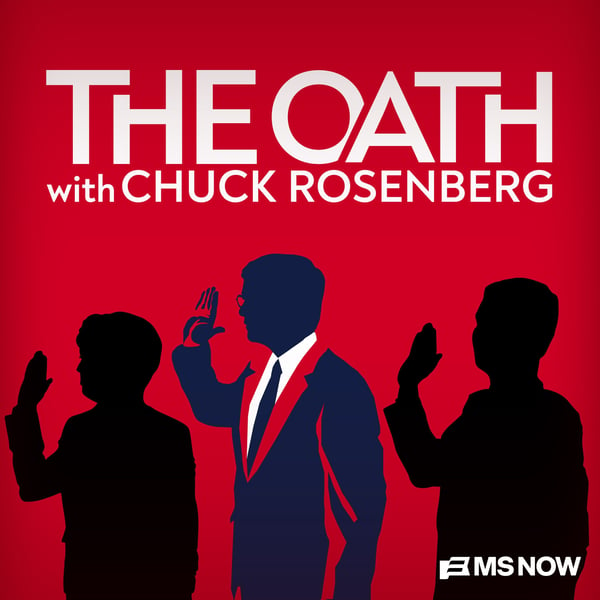Vivek Murthy: The Nation’s Doctor
The Oath with Chuck Rosenberg
MS NOW, Chuck Rosenberg
4.8 • 15.8K Ratings
🗓️ 17 June 2020
⏱️ 87 minutes
🧾️ Download transcript
Summary
Transcript
Click on a timestamp to play from that location
| 0:00.0 | I do solemnly swear that I will support and defend the Constitution of the United States against all enemies, foreign and domestic. |
| 0:11.0 | But I will bear true faith and allegiance to the sea that I take this obligation freely without any mental reservation or purpose of evasion and that I will will inflate the lead discharge. |
| 0:21.0 | The duties of the office on which I am about to enter. So help me God, so help me God. |
| 0:27.0 | So help me God. |
| 0:29.0 | Welcome to the oath. I'm Chuck Rosenberg and I am honored to be your host for another compelling conversation with a fascinating guest from the World of Public Service. This week we talk to our first doctor, my guest is Vivek Murthy, the former Surgeon General of the United States. |
| 0:45.0 | Vivek is a deeply thoughtful and reflective medical professional who served as the Surgeon General and simultaneously as a vice admiral in the Public Health Service Commission Corps. |
| 0:56.0 | In that role and after an exhaustive listening tour throughout the country, at the beginning of his tenure as the nation's doctor, Vivek realized that loneliness is a pervasive medical issue in our country and that it is both a cause of and a consequence of chronic illness. |
| 1:12.0 | In his powerful and illuminating new book, Together Vivek explores the role of loneliness in society and its relationship to chronic illness and prescribes ways that we can identify it, think about it and counter it. |
| 1:25.0 | Vivek Murthy, welcome to the oath. |
| 1:27.0 | Thanks so much, Chuck. Thanks for having me on. |
| 1:29.0 | It was a real pleasure to be with you. I appreciate you're making some time for us. Of course. |
| 1:33.0 | You were born in England, but your parents immigrated to England from India. Tell us a little bit about them in their journey. |
| 1:39.0 | They both grew up in, I would say, a modest background in India. My mother was from a middle class background. She grew up in Bangalore, a large city in the south. |
| 1:50.0 | My father grew up quite poor, actually, in a small farming village in South India. His grandfather was a farmer. His father was a farmer, and he was expected to be a farmer as well. |
| 2:01.0 | His life took a different path, but in the village in those days, poverty levels were high and people had very little in the way of material possessions. My father, for example, |
| 2:11.0 | I think he was 15 or 16 years old before he owned his first pair of footwear. |
| 2:16.0 | And it was times were tough, but what they were rich in were relationships. He supported each other, they helped each other. |
| 2:24.0 | All of that made it extremely unlikely that two people who had those backgrounds would actually leave. |
| 2:29.0 | My father eventually found his way through school, which was very unusual. I actually went to college, which was the first in his village, along with his brother to go to college. |
| 2:38.0 | How did that happen? Well, I think he attributes it to his father, who was very intent on his children being successful and being educated, even though he himself had not completed elementary school. |
| 2:51.0 | In fact, he went so far as to tell his three sons what they would become. So he told my father's elder brother that he would be an engineer. |
| 2:59.0 | He told my father you need to become a doctor, and he told my father's younger brother that he had to become an agricultural expert, a horticulturist. |
... |
Please login to see the full transcript.
Disclaimer: The podcast and artwork embedded on this page are from MS NOW, Chuck Rosenberg, and are the property of its owner and not affiliated with or endorsed by Tapesearch.
Generated transcripts are the property of MS NOW, Chuck Rosenberg and are distributed freely under the Fair Use doctrine. Transcripts generated by Tapesearch are not guaranteed to be accurate.
Copyright © Tapesearch 2025.

